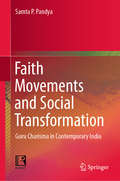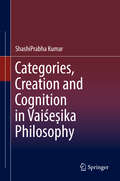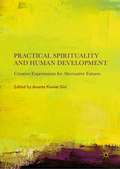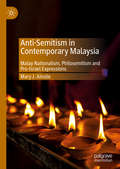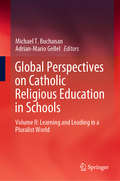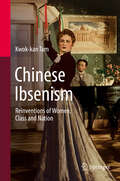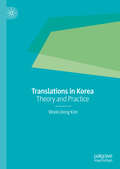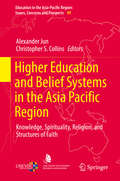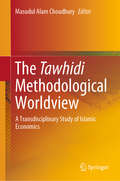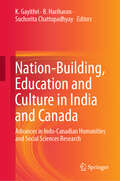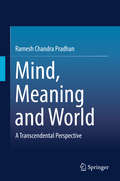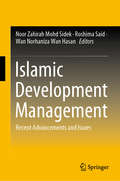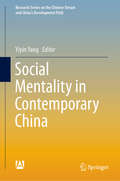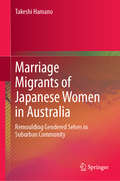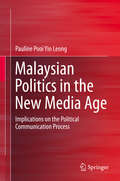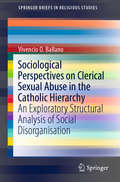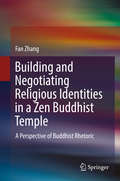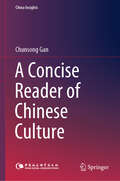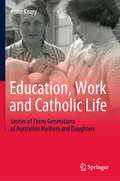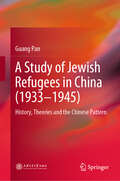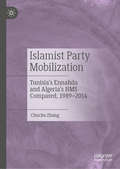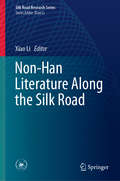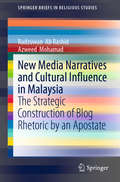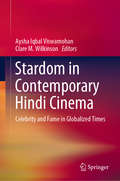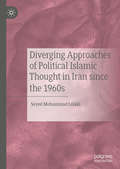- Table View
- List View
Faith Movements and Social Transformation: Guru Charisma In Contemporary India
by Samta P. PandyaThis book examines the role of Hindu-inspired faith movements (HIFMs) in contemporary India as actors in social transformation. It further situates these movements in the context of the global political economy where such movements cross national boundaries to locate believers among the Hindu diaspora and others. In contemporary neoliberal India, HIFMs have become important actors, and they realize themselves by making public assertions through service. The four pillars of the contemporary presence of such movements are: gurus, sociality, hegemony and social transformation. Gurus, who spearhead these movements, create a matrix of possible meanings in their public discourses which their followers pick up to create messages of personal and social change. Sociality is a core strategy of proliferation across such movements and implies social service, which is qualified by memories of the guru and what they are believed to embody. Hegemony is reflected in the fact that social service in such movements often ominously imbibes right-wing or far-right Hinduism. They propose a model of Hindu-inspired social transformation, involving faith building into and transforming the civil society. The book discusses in a nuanced way several Hindu-inspired faith movements of various hues which have made national and international impact.This topical book is of interest to students and researchers in the fields of sociology, anthropology, social work, and social psychology, with a special interest in the study of religious movements.
Categories, Creation and Cognition in Vaiśeṣika Philosophy
by ShashiPrabha KumarThe proposed book presents an overview of select theories in the classical Vaiśeṣika system of Indian philosophy, such as the concept of categories, creation and existence, atomic theory, consciousness and cognition. It also expounds in detail the concept of dharma, the idea of the highest good and expert testimony as a valid means of knowing in Vaiśeṣika thought. Some of the major themes discussed are the religious inclination of Vaiśeṣika thought towards Pasupata Saivism, the affiliation of the Vaiśeṣika System to the basic foundations of Indian philosophical thought, namely Veda and Yoga, and their insights into science, hermeneutics and metaphysics. In addition, this book includes recent Sanskrit commentaries on key Vaiśeṣika texts and provides a glimpse of Vaiśeṣika studies across the world. Overall, this book enunciates the Vaiśeṣika view from original sources and is an important work for Vaiśeṣika studies in current times for serious students as well as researchers.
Practical Spirituality and Human Development: Creative Experiments for Alternative Futures
by Ananta Kumar GiriThis book explores varieties of spiritual movements and alternative experiments for the generation of beauty, dignity and dialogue in a world where the rise of the religious in politics and the public sphere is often accompanied by violence. It examines how spirituality can contribute to human development, social transformations and planetary realizations, urging us to treat each other, and our planet, with evolutionary care and respect. Trans-disciplinary and trans-paradigmatic to its very core, this text opens new pathways of practical spirituality and humanistic action for both scholarship and discourse and offers an invaluable companion for scholars across religious studies, cultural studies and development studies.
Anti-Semitism in Contemporary Malaysia: Malay Nationalism, Philosemitism and Pro-Israel Expressions (Palgrave Series In Asia And Pacific Studies)
by Mary J. AinslieOffering an empirical study into anti-Semitism and anti-Israel attitudes in Malaysia, this book examines the complicated nature and function of such beliefs within the contemporary context, mapping these discourses onto different ethnic and economic divisions. Based largely upon qualitative interviews with thirty Malaysian participants who detail their own experiences with and perceptions of this phenomenon, the project reveals how political actors and organizations in Malaysia achieve political success and maintain political power through investing in the Palestinian cause, simultaneously demonizing Israel and Jews to an astounding degree. However, the book also reveals how, in contrast to this state-led agenda, challenging anti-Semitism and pushing for dialogue with Israel has become a means by which progressive citizens can critique authorities and reassert their desire for a liberal and heterogenic Malaysia. The book therefore argues that both interest in and even support for Judaism and Israel may be more prominent than the official Malaysian position may suggest, with citizens holding far more complex opinions and views upon this subject matter.
Global Perspectives on Catholic Religious Education in Schools: Volume II: Learning and Leading in a Pluralist World
by Adrian-Mario Gellel Michael T. BuchananThis book shares global perspectives on Catholic religious education in schools, chiefly focusing on educational and curriculum issues that take into account the theology and the pedagogy which support learning in connection with Catholic religious education. Further, it offers insights into the distinctive contribution that Catholic religious education makes to religious education and education in general across diverse schooling contexts. Bringing together insights from leading scholars and experts on Catholic religious education around the globe, the book offers an essential reference guide for all those involved in researching, planning and designing curricula for Catholic religious education, as well as developing related theories in the field.
Chinese Ibsenism: Reinventions of Women, Class and Nation
by Kwok-kan TamThis book is a study of the relation between theatre art and ideology in the Chinese experimentations with new selfhood as a result of Ibsen’s impact. It also explores Ibsenian notions of self, women and gender in China and provides an illuminating study of Chinese theatre as a public sphere in the dissemination of radical ideas. Ibsen is the major source of modern Chinese selfhood which carries notions of personal and social liberation and has exerted great impacts on Chinese revolutions since the beginning of the twentieth century. Ibsen’s idea of the self as an individual has led to various experimentations in theatre, film and fiction to project new notions of selfhood, in particular women’s selfhood, throughout the history of modern China. Even today, China is experimenting with Ibsen’s notions of gender, power, individualism and self.Kwok-kan Tam is Chair Professor of English and Dean of Humanities and Social Science at the Hang Seng University of Hong Kong. He was Head (2012-18) and is currently a member of the International Ibsen Committee, University of Oslo. He is a Foundation Fellow of the Hong Kong Academy of the Humanities. He has held teaching, research and administrative positions in various institutions, including the East-West Center, the Chinese University of Hong Kong and the Open University of Hong Kong. He has published numerous books and articles on Ibsen, Gao Xingjian, modern drama, Chinese film, postcolonial literature, and world Englishes. His recent books include Ibsen, Power and the Self: Postsocialist Experimentations in Stage Performance and Film (2019), The Englishized Subject: Postcolonial Writings in Hong Kong, Singapore and Malaysia (2019), and a co-edited volume Fate and Prognostication in the Chinese Literary Imagination (2019).
Translations in Korea: Theory and Practice
by Wook-Dong KimThis book explores practical and theoretical approaches to translation in Korea from the 16th century onwards, examining a variety of translations done in Korea from a diachronic perspective. Offering a discussion of the methodology for translating the Xiaoxue (Lesser or Elementary Learning), a primary textbook for Confucianism in China and other East Asian countries, the book considers the problems involving Korean Bible translation in general and the Term Question in particular. It examines James Scarth Gale, an early Canadian Protestant missionary to Korea, as one of the language’s remarkable translators. The book additionally compares three English versions of the Korean Declaration of Independence of 1919, arguing that the significant differences between them are due both to the translators’ political vision for an independent Korea as well as to their careers and Weltanschauungen. The book concludes with a detailed analysis of Deborah Smith’s English translation of ‘The Vegetarian’ by Han Kang, which won the 2016 Man Booker International Prize for Fiction.
Higher Education and Belief Systems in the Asia Pacific Region: Knowledge, Spirituality, Religion, and Structures of Faith (Education in the Asia-Pacific Region: Issues, Concerns and Prospects #49)
by Alexander Jun Christopher S. CollinsThis book underscores the role of belief and knowledge that are outside the canons of science, as they are not often considered within the core functions of a university. It explores various ways in which belief systems are part of the fabric of higher education – either implicitly or explicitly – and pursues a deeper understanding of the role of belief practices as it plays out in both private and public higher education. The broad variety of geographic locations and belief systems represented here demonstrate the ways in which implicit and explicit belief systems affect higher education. The book is unique in its breadth of coverage, but also in its depth of exploration regarding how belief systems function in society through the avenue of higher education, which is often a central site for the production and dissemination of knowledge.
The Tawhidi Methodological Worldview: A Transdisciplinary Study of Islamic Economics
by Masudul Alam ChoudhuryThis book develops and applies the methodology of Tawhid (“monotheism”) as law and the Sunnah (the teachings of Prophet Muhammad) in the Qur’an in establishing a transdisciplinary foundation for the study of Islamic economics, finance, society, and science. It employs the Tawhidi String Relation (TSR), a new theoretical framework in contemporary Islamic sciences, in the methodological formalisation and application of the Tawhidi worldview - as the primal ontological law of monotheism. It employs a deeply Qur’anic exegesis, and a mathematical, philosophical, and socio-scientific mode of inquiry in deriving, developing, and empirically applying the Qur’anic methodology of “unity of knowledge”. It is the first book of its kind in rigorously studying the true foundation of the Qur’anic concept of ‘everything’ - as the world-system extending between the heavens and Earth. The qur’anic terminology of the precept of this “world-system” in its most comprehensive perspective is A’lameen, the terminology in the Qur’an that accounts for the generality and details of the world-systems that are governed by the method of evaluation of the objective criterion of wellbeing. Wellbeing objective criterion is evaluated subject to inter-causal relations between systemic entities, variables, and functions. The cardinal principle of Tawhid in its relationship with the world-system conveys the corporeal meaning of monotheism in its cognitive implication of abstraction and application. Such a study has not been undertaken in existing Islamic socio-scientific literature in analysing Islamic economics, finance, science, and society collectively, using Tawhidi law as a theoretical framework. This book will be relevant to all such scholars who are interested in studying the monotheistic law and the Islamic principles, particularly Tawhid, Shari’ah, and Islamic philosophical thought.
Nation-Building, Education and Culture in India and Canada: Advances in Indo-Canadian Humanities and Social Sciences Research
by K. Gayithri B. Hariharan Suchorita ChattopadhyayThis volume provides comparative perspectives on issues related to education, culture, sustainable development and nation-building in India and Canada. It takes cognizance of current research in Indo-Canadian comparative studies and is meant to facilitate further research in these areas. It importantly highlights the trends and growth areas in comparative social science and humanities research between the countries. The chapters in this volume discuss the research that scholars have recently undertaken in both countries and the impact that such comparative research has on developing partnerships, learning methodologies, and socio-cultural narratives that empower interdisciplinary research. The chapter authors take up important issues related to community college development, mental health in education, multilingual education, indigenous populations and their education and development. They discuss issues related to bilateral and foreign trade agreements as well as policies of the two countries on climate change research. Lastly, they discuss indigenous performance cultures and sports in the two countries and the long history of migration from India to Canada. The volume is of interest to a wide readership from the humanities and social sciences, particularly readers interested in Indo-Canadian scholarship.
Mind, Meaning and World: A Transcendental Perspective
by Ramesh Chandra PradhanThe present book intends to approach the problem of mind, meaning and consciousness from a non-naturalist or transcendental point of view. The naturalization of consciousness has reached a dead-end. There can be no proper solution to the problem of mind within the naturalist framework. This work intends to reverse this trend and bring back the long neglected transcendental theory laid down by Kant and Husserl in the West and Vedanta and Buddhism in India. The novelty of this approach lies in how we can make an autonomous space for mind and meaning without denying its connection with the world. The transcendental theory does not disown the embodied nature of consciousness, but goes beyond the body in search of higher meanings and values. The scope of this work extends from mind and consciousness to the world and brings the world into the space of mind and meaning with a hope to enchant the world. The world needs to be retrieved from the stranglehold of scientism and naturalism. This book will dispel the illusion about naturalism which has gripped the minds of our generation. The researchers interested in the philosophy of mind and consciousness can benefit from this work.
Islamic Development Management: Recent Advancements and Issues
by Noor Zahirah Mohd Sidek Roshima Said Wan Norhaniza Wan HasanThis book examines a range of current issues in Islamic development management. The first part of the book explores practical issues in governance and the application of Islamic governance in new areas such as quality management systems and the tourism industry, while the second delves into questions of sustainability. The book proposes a new Islamic sustainability and offers new perspectives on CSR in connection with waqf (Islamic endowments) and microfinance. The third part of the book addresses Islamic values and how they are applied in entrepreneurship, inheritance, consumer behavior and marketing. The fourth part examines the issues of waqf and takaful (a form of insurance in line with the Islamic laws), while the fifth discusses the fiqh (the study of Islamic legal codes) and legal framework from the perspectives of entrepreneurship, higher education, reporting and inheritance (wills). The final chapter is dedicated to the application of Islamic principles in various other issues.Written in an accessible style, the book will appeal to newcomers to the field, as well as researchers and academics with an interest in Islamic development management.
Social Mentality in Contemporary China (Research Series on the Chinese Dream and China’s Development Path)
by Yiyin YangThis book not only seeks to theoretically analyze the concept, chief characteristics and framework of “social mentality”, but also explores the influence of social mentality on such elements of social functioning as individuals, groups, societies, markets and countries, and the influence of such elements as cultural, social, economic, political and mental factors on social mentality. Besides, this book discusses the structure of social mentality, tools for measuring it, and an indicator system. What’s more, it explores the role of the social mentality mechanism in the construction of harmonious societies.
Marriage Migrants of Japanese Women in Australia: Remoulding Gendered Selves in Suburban Community
by Takeshi HamanoThis book investigates the experience of Japanese women who have immigrated to Australia through marriage to a local partner. Based on long-term participant observations gathered with a Japanese ethnic association in Sydney, and on in-depth interviews with the association’s members, it examines the ways in which the women remould themselves in Australia by constructing gendered selves that reflect their unique migratory circumstances through cross-border marriage.In turn, the book argues that the women tend to embrace expressions of Japanese femininity that they once viewed negatively, and that this is due to their lack of social skills and access to the cultural capital of mainstream Australian society. Re-molding the self through conventional Japanese notions of gender ironically provides them with a convincing identity: that of minority migrant women. Nevertheless, by analyzing these women’s engagement with a Japanese ethnic association in a suburb of Sydney, the book also reveals a nuanced sense of ambivalence; a tension between the women’s Japanese community and their lives in Australia.Accordingly, the book provides a fresh perspective on interdisciplinary issues of gender and migration in a globalized world, and engages with a wide range of academic disciplines including: sociology of migration; sociology of culture; cultural anthropology; cultural studies; Japanese studies; Asian studies; gender studies; family studies; migration studies and qualitative methodologies.
Malaysian Politics in the New Media Age: Implications on the Political Communication Process
by Pauline Pooi Yin LeongThis book provides a comprehensive overview of the impact of the Internet on Malaysian politics and how it has played a pivotal role in influencing the country’s political climate. It lays out the background of Malaysia’s political history and media environment, and addresses the ramifications of media-isation for the political process, including political public relations, advertising and online campaigns. The book examines the Internet’s transformative role and effect on Malaysian democracy, as well as its consequences for political actors and the citizenry, such as the development of cyber-warfare, and the rise of propaganda or “fake” news in the online domain. It also investigates the interplay between traditional and new media with regard to the evolution of politics in Malaysia, especially as a watchdog on accountability and transparency, and contributes to the current discourse on the climate of Malaysian politics following the rise of new media in the country. This book is particularly timely in the wake of the 2018 Malaysian general election, and will be of interest to students and researchers in communications, politics, new media and cultural studies.
Sociological Perspectives on Clerical Sexual Abuse in the Catholic Hierarchy: An Exploratory Structural Analysis of Social Disorganisation (SpringerBriefs in Religious Studies)
by Vivencio O. BallanoThis book, as an exploratory sociological analysis, broadly examines the major structural factors which contribute to the social disorganization of the Catholic hierarchy as a clerical community, facilitating the persistence of clerical sexual abuse in the Catholic Church. Using some tenets of the social disorganization theory on crime and deviance as the overall theoretical framework with some perspectives from social organization, social network, and social capital, and secondary literature and qualitative data to support the arguments, it examines the (1) diocesan clergy’s social interaction, mutual support, and social control system in the hierarchical community, (2) connection between mandated clerical celibacy and clerical sexual abuse, and (3) the implication of the laity’s lack of empowerment and ecclesiastical authority to monitor and sanction clerical behavior. The Catholic hierarchy prides itself as a unified community of clerics under the Pope who shares the one priesthood of Christ. But the current clerical sexual scandals and the inability of bishops to adequately manage clerical sexual abuse cases make one wonders whether the Catholic clergy is indeed a cohesive and socially organized community which inhibits clerical sexual abuse. This book invites Church authorities, theologians, scholars, and lay leaders to understand the persistent clerical sexual abuse empirically and to come up with structural reforms which enhance the social network and social control systems of the Catholic hierarchy against clerical sexual misconduct and support victims.
Building and Negotiating Religious Identities in a Zen Buddhist Temple: A Perspective of Buddhist Rhetoric
by Fan ZhangThis book explores the practices in a Zen Buddhist temple located in Northwest Ohio against the backdrop of globalization. Drawing on the previous studies on Buddhist modernization and westernization, it provides a better understanding of the westernization of Buddhism and its adapted practices and rituals in the host culture. Using rhetorical criticism methodology, the author approaches this temple as an embodiment of Buddhist rhetoric with both discursive and non-discursive expressions within the discourses of modernity. By analyzing the rhetorical practices at the temple through abbots’ teaching videos, the temple website, members’ dharma names, and the materiality of the temple space and artifacts, the author discovers how Buddhist rhetoric functions to constitute and negotiate the religious identities of the community members through its various rituals and activities. At the same time, the author examines how the temple’s space and settings facilitate the collective the formation and preservation of the Buddhist identity. Through a nuanced discussion of Buddhist rhetoric, this book illuminates a new rhetorical methodology to understand religious identity construction. Furthermore, it offers deeper insights into the future development of modern Buddhism, which are also applicable to Buddhist practitioners and other major world religions.
A Concise Reader of Chinese Culture (China Insights)
by Chunsong GanThis book uses the mutual interactions between Chinese and Western culture as a point of departure in order to concisely introduce the origins and evolution of Chinese culture at the aspects of constitution, thinking, values and atheistic. This book also analyzes utensil culture, constitution culture and ideology culture, which were perfected by absorbing classic arguments from academia. As such, the book offers an essential guide to understanding the development, civilization and key ideologies in Chinese history, and will thus help to promote Chinese culture and increase cultural awareness.
Education, Work and Catholic Life: Stories of Three Generations of Australian Mothers and Daughters
by Anne KearyThis book reports on innovative interdisciplinary research in the field of cultural studies. The study spans the early twentieth to twenty-first centuries and fills a gap in our understanding of how girls’ and women’s religious identity is shaped by maternal and institutional relations. The unique research focuses on the stories of thirteen groups of Australian mothers and daughters, including the maternal genealogy of the editor of the book. Extended conversations conducted twenty years apart provide a situated approach to locating the everyday practices of women, while the oral storytelling presents a rich portrayal of how these girls and women view themselves and their relationship as mothers and daughters. The book introduces the key themes of education, work and life transitions as they intersect with generational change and continuity, gender and religion, and the non-linear transitional stories are told across the life-course examining how Catholic pasts shaped, and continue to shape, the participants’ lives. Adopting a multi-methodological approach to research drawing on photographs, memorabilia passed among mothers and daughters, journal entries and letters, it describes how women’s lives are lived in different spaces and negotiated through diverse material and symbolic dimensions.
A Study of Jewish Refugees in China (1933–1945): History, Theories and the Chinese Pattern
by Guang PanThis book comprehensively discusses the topic of Jews fleeing the Holocaust to China. It is divided into three parts: historical facts; theories; and the Chinese model. The first part addresses the formation, development and end of the Jewish refugee community in China, offering a systematic review of the history of Jewish Diaspora, including historical and recent events bringing European Jews to China; Jewish refugees arriving in China: route, time, number and settlement; the Jewish refugee community in Shanghai; Jewish refugees in other Chinese cities; the "Final Solution" for Jewish refugees in Shanghai and the “Designated Area for Stateless Refugees”; friendship between the Jewish refugees and the local Chinese people; the departure of Jews and the end of the Jewish refugee community in China. The second part provides deeper perspectives on the Jewish refugees in China and the relationship between Jews and the Chinese. The third part explores the Chinese model in the history of Jewish Diaspora, focusing on the Jews fleeing the Holocaust to China and compares the Jewish refugees in China with those in other parts of the world. It also introduces the Chinese model concept and presents the five features of the model.
Islamist Party Mobilization: Tunisia’s Ennahda and Algeria’s HMS Compared, 1989–2014
by Chuchu ZhangThis book aims to explore how Islamist parties mobilize debates, discourses, and environments in electoral authoritarian systems. Interrelating three theoretical schools, Electoral Authoritarianism Theory, Protest Voting Theory, and Political Process Theory, it adopts and expands on a demand-and-supply framework to approach the subject in a novel way, and adapts them to address North Africa, a region in which such theoretical scholarship has until now not been conducted. In-depth case studies focus on two Islamist parties in North Africa, Tunisia’s Ennahda and Algeria’s HMS, both of which adopted the Muslim Brotherhood model, had charismatic leaders, and were active in the political scene from 1989-2014, the period between their first electoral trial and their electoral participation after taking part in governance. The chapters proceed chronologically, providing a historical treatment of the evolution of Ennahda and the HMS since their inception and addressing their development in two and a half decades.
Non-Han Literature Along the Silk Road (Silk Road Research Series)
by Xiao LiThis volume includes outstanding scientific articles on documents written in ancient languages such as Tocharian, Sogdian, Khotanese, and Old Uyghur. Its chief aims are to contribute to the present state of research by adding essential findings on newly discovered historical documents; to present a multi-dimensional investigation of diverse aspects including the history, religion, art, literature, and social life along the Silk Road; and to outline potential future research directions for non-Han literature studies and inspire research into other aspects, such as economics and comparative studies.
New Media Narratives and Cultural Influence in Malaysia: The Strategic Construction of Blog Rhetoric by an Apostate (SpringerBriefs in Religious Studies)
by Azweed Mohamad Radzuwan Ab RashidThis book in religious studies uses a Malaysian apostasy case study as a platform to investigate and discuss the broader radicalisation of apostates on social networking sites. It provides new insights into the emerging phenomenon of how social media tools are harnessed to promote faith and beliefs systems, specifically looking at the Malay view of apostasy from Islam. Employing sociocultural theory and theoretical concepts to analyse the discursive behaviour of a Malaysian apostate on a social networking site, the study unpacks how digital storytelling and rhetorical strategies can influence readers, culturally and socially, and contribute to identity construction in relation to politicised viewpoints. The analysis of the discourse surrounding apostasy in Malaysia enables parallels to be drawn to such discourses in other parts of the world, raising discussions on the connections between inflammatory online rhetoric and social problems, such as recruitment to terrorism, involvement in gangs or the use of addictive substances. This book is of particular interest to scholars and students considering the intersection of critical discourse analysis and religious studies. It is of interest to sociolinguists and psychologists interested in online media.
Stardom in Contemporary Hindi Cinema: Celebrity and Fame in Globalized Times
by Aysha Iqbal Viswamohan Clare M. WilkinsonIn this book, film scholars, anthropologists, and critics discuss star-making in the contemporary Hindi-language film industry in India, also known as “Bollywood.” Drawing on theories of stardom, globalization, transnationalism, gender, and new media studies, the chapters explore contemporary Hindi film celebrity. With the rise of social media and India’s increased engagement in the global economy, Hindi film stars are forging their identities not just through their on-screen images and magazine and advertising appearances, but also through an array of media platforms, product endorsements, setting fashion trends, and involvement in social causes. Focusing on some of the best-known Indian stars since the late 1990s, the book discusses the multiplying avenues for forging a star identity, the strategies industry outsiders adopt to become stars, and the contradictions and conflicts that such star-making produces. It addresses questions such as: What traits of contemporary stars have contributed most to longevity and success in the industry? How has filmmaking technology and practice altered the nature of stardom? How has the manufacture of celebrity altered with the recent appearance of commodity culture in India and the rise of a hyper-connected global economy? By doing so, it describes a distinct moment in India and in the world in which stars and stardom are drawn more closely than ever into the vital events of global culture. Hindi films and their stars are part of the national and global entertainment circuits that are bigger and more competitive than ever. As such, this is a timely book creates opportunities for examining stardom in other industries and provides fruitful cross-cultural perspectives on star identities today."Grounded in rigorous scholarship as well as a palpable love of Hindi cinema, this collection of 19 essays on a dizzying array of contemporary Hindi film stars makes for an informative, thought-provoking, illuminating, and most of all, a joyful read. Pushing boundaries of not only global Star Studies but also film theory as a whole, this de-colonised and de-colonising volume is a must read for film scholars, students and cinephiles!" Dr. Sunny Singh, Senior Lecturer - Creative Writing and English Literature, Sir John Cass School of Art, Architecture & Design, London Metropolitan University “A wide-ranging overview of Hindi cinema’s filmi firmament today, focussing on its most intriguing and brightest-burning stars. The variety of approaches to stardom and celebrity by both established and upcoming scholars reveals a web of interconnecting stories and concerns that provide fascinating new insights into the workings of today's Hindi film industry, while shining fresh light on contemporary India and the world we live in.” Professor Rosie Thomas, Centre for Research and Education in Arts and Media (CREAM), College of Design, Creative and Digital Industries, University of Westminster
Diverging Approaches of Political Islamic Thought in Iran since the 1960s
by Seyed Mohammad LolakiThis book argues that Political Islam in the Iranian context evolved into three main schools of thought during the 1960s and 1970s: Jurisprudential Islam led by Ayatollah Khomeini, Leftist Islam led by Shariati, and Liberal Islam led by Bazargan. Despite the fact that all schools seek an Islamic state, their chosen methods and philosophical approaches diverge considerably. The synthesis of these three contrasting socio-political views is structured here to provide a coherent interpretation by means of ongoing comparison. This method has so far not been presented in academic studies within the field of Political Islam.Furthermore, this book provides a critical analysis of the aforementioned ‘Political Islam’ schools in Iran, their similarities and differences, relative success or failure, their contribution to the revolution of 1979 and how they have evolved from the pre-revolution era to the present.
